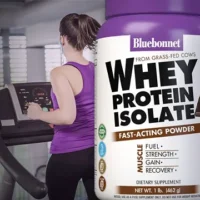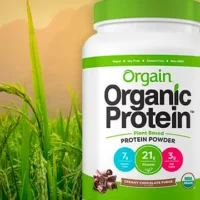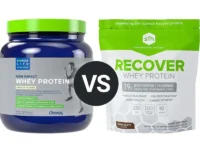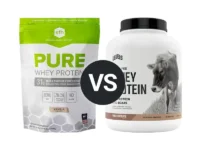Knowledge BaseYou're Questions Answered
Why would someone choose soy-free protein powder?
There are several reasons why individuals might opt for soy-free protein powders, ranging from health concerns to personal preferences. Below, we discuss the common factors that influence this choice, including allergies, hormonal effects, dietary preferences, and the desire for diverse protein sources.
Reasons to Choose Soy-Free Protein Powder
1. Allergies or Intolerances
One of the most straightforward reasons to choose soy-free protein powder is the presence of a soy allergy or intolerance. Soy allergies can cause various adverse reactions, such as hives, itching, swelling, digestive issues, and in severe cases, anaphylaxis. For those with soy intolerance, consuming soy can lead to uncomfortable digestive symptoms like bloating, gas, and diarrhea. Choosing a soy-free protein powder helps these individuals avoid these adverse effects and ensures their protein supplementation is safe1.
2. Hormonal Effects
Soy contains phytoestrogens, plant-based compounds that mimic estrogen in the body. While phytoestrogens can have beneficial effects for some, such as reducing menopausal symptoms, there is concern about their potential hormonal effects, particularly in large quantities. This is especially relevant for men, who may worry about the effects on testosterone levels, and for individuals with hormone-sensitive conditions, such as a history of breast cancer. As a result, some people choose to avoid soy-based products, including protein powders, to minimize these potential risks2.
3. Personal Preferences and Dietary Restrictions
Personal or cultural preferences can also play a role in the decision to avoid soy. Some people may simply prefer the taste, texture, or perceived health benefits of other protein sources. Additionally, individuals following specific dietary restrictions or philosophies may choose to diversify their protein intake. For example, someone may prefer a mix of plant-based proteins like pea, rice, hemp, or pumpkin seed protein to obtain a broader spectrum of amino acids and nutrients3.
4. Vegan or Vegetarian Diets
Soy is a common protein source for vegans and vegetarians due to its complete amino acid profile. However, some individuals within these dietary groups choose to avoid soy-based products in favor of other plant-based proteins. This preference may stem from concerns about the environmental impact of soy farming, potential GMO (genetically modified organism) content, or a desire for dietary variety. Alternative plant-based protein sources such as pea, rice, hemp, or pumpkin seed protein powders offer diverse nutritional profiles and can help meet protein needs without relying on soy4.
Choosing the Right Soy-Free Protein Powder
When selecting a soy-free protein powder, it is essential to consider individual dietary needs and preferences. Look for products that offer complete protein sources, contain minimal additives or fillers, and have a good safety and efficacy profile. Reading labels and selecting high-quality, reputable brands can help ensure that the protein powder aligns with personal health goals and dietary restrictions.
- Messina, M. J. (2016). Soy and health update: evaluation of the clinical and epidemiologic literature. Nutrients, 8(12), 754.
- Malinauskas, B. M., & Walzem, R. L. (2017). Whey protein and soy protein ingestion stimulates muscle protein synthesis to a similar extent in response to resistance exercise in elderly men. Nutrition research, 47, 48-57.
- Hoffman, J. R., Falvo, M. J., & Mangine, G. T. (2019). Soy protein–based supplements: a burgeoning trend in the sports nutrition marketplace. Journal of the International Society of Sports Nutrition, 16(1), 1-9.
- van Vliet, S., Burd, N. A., & van Loon, L. J. (2015). The skeletal muscle anabolic response to plant- versus animal-based protein consumption. The Journal of nutrition, 145(9), 1981-1991.
Related Questions
Related Reviews
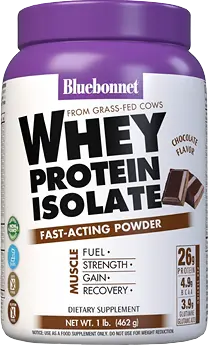
Your Answer
We are a participant in the Amazon Services LLC Associates Program, an affiliate advertising program designed to provide a means for us to earn fees by linking to Amazon.com and affiliated sites.
